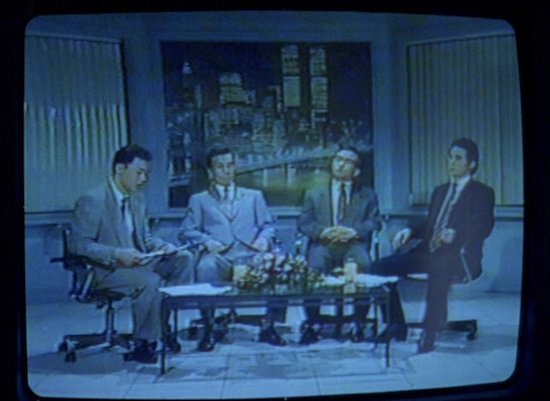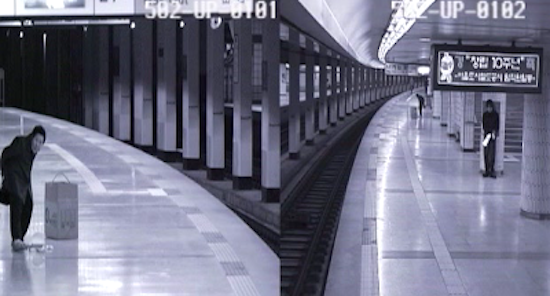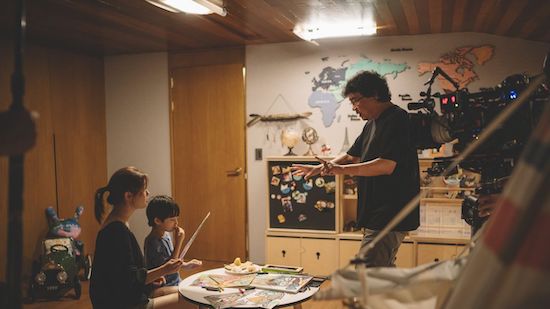It should come as no surprise that this year’s London Korean Film Festival is the most hotly-anticipated in the event’s 15-year history. With Bong Joon-ho’s incredible Parasite Oscars sweep still fresh in the minds of film fans worldwide, 2020 has proven to be a year to remember for the Hallyuwood film industry — even if it’s been forgettable for everyone else.
In the face of widespread cinema closures, LKFF remains committed to their cause. Amidst an expertly-curated schedule that includes a vital strand on Women’s Voices and hyper-contemporary blockbusters like Ashfall, the 2020 festival will celebrate a monumental year by screening two outstanding early Bong Joon-ho short films for the first time in the UK. Better yet, they’ll both be available to stream on-demand shortly.
The first film is Incoherence, an anthology of short stories that allegorise the hypocrisy of the ruling class. Filmed in 1994 as director Bong’s graduation project at the Korean Academy of Film Arts, it shows the foundations of the darkly comic style present in much of his later work. A decade later, Influenza would demonstrate Bong’s innovative streak through a 30-minute, documentary-style short filmed entirely using real CCTV cameras in Seoul. The film follows the downward spiral of a man who turns to violent crime over a five-year period.
But these two shorts offer more than just an opportunity to explore obscure early works by this year’s Academy-certified Best Director – they also tell the story of the meteoric rise of Korean cinema in the late ’90s and early ’00s. Filmed ten years apart, these works present a "before" and "after" through which to understand a vital period of change in Korean cultural history; a period that established a New Wave of Korean Cinema amidst significant political and social upheaval; a prologue to the international popularity of "Hallyuwood" today.
There couldn’t be a more telling sign that a transformation had taken place between 1994 and 2004 than in the production titles that open each film. Whereas Influenza begins with colourful animations of blooming flowers and a twinkling musical refrain (courtesy of its Jeonju International Film Festival sponsorship), 1994’s Incoherence opens with a crude disclaimer about the use of names of real institutions within the film. It’s not so much the statement that "no political or social comments should be inferred" that’s of note — but rather, the coarse military marching band theme that accompanies it.
It took a major global financial crisis in 1997, significantly affecting much of East Asia, for South Korea to finally elect a liberal President after half a century of conservative ruling. The country had been gripped by strict military dictatorships for decades prior, and South Korea’s transformation during this period is no more apparent than through "the Nelson Mandela of Asia" himself.
In 1973, future President Kim Dae-jung was kidnapped from a hotel room by intelligence agents, tied up, gagged and blindfolded; seven years later he would be sentenced to death following a military coup by Army General Chun Doo-hwan. In 2000, the still-alive, now-President Dae-jung was awarded the Nobel Peace Prize for bringing democracy to South Korea and reconciling relationships with North Korea and Japan.

While South Korea did rapidly democratise after 1987 as the Sixth Republic was established, the country still had one foot in the past at the time that Bong directed Incoherence. Only a decade prior, independent filmmaking had been completely illegal, and it wasn’t until military leader Roh Tae-woo enacted a new constitution in 1988 that the government finally eased on the importing of foreign films. It was a watershed moment for the nation’s emerging creative talent, who found themselves inspired: "I saw a lot of foreign films that they’d air on television," Bong told South Korean television network MBC in 2014. "I was obsessed with them."
The influence of American culture is palpable in Incoherence. The opening chapter of the three-part anthology concerns a professor who leaves a copy of Penthouse magazine chock-full of big-bosomed blonde women on his office desk. Shortly after, he accidentally sends a student to retrieve files from the same room in the middle of teaching a lecture on "Adorno’s notion of authoritarian personality". If the tongue-in-cheek reference to the censorship of foreign goods wasn’t already obvious, then the Hitchcockian strings of the score make it clear.
In the following chapter, during a scene that could have been plucked directly from Parasite, a jogger pretends to be the homeowner of a gated mansion, perching on the steps as a hapless delivery boy delivers him milk and newspapers. When the two meet again following the innocent distributor’s rebuke at the hands of the wealthy proprietor, it is framed as a Mexican standoff — and accompanied by Spanish guitars a la classic Hollywood Westerns.
These themes of social injustice and class conflict that would later become a mainstay of Bong’s career (particularly potent in Snowpiercer and Parasite), but it is in Incoherence‘s epilogue that a brilliant punchline is delivered. A newsflash declares "moral crisis in our country", and in a thinly-veiled critique, a group of flawed panel guests blame "popular culture" for the sins of the younger generation, citing a "40% increase in minor violations" since the advent of civilian government.
Fast-forward ten years and Influenza would mark the moment the Hallyu wave was hitting its first peak. Park Chan-wook’s Oldboy was a worldwide sensation by 2004. And the filmmaker’s previous film JSA: Joint Security Area (one of the first films to paint North Korean characters in a sympathetic light, prompted by the work of President Kim Dae-jung) had made history in 2000 as the highest-grossing film in Korean box office history. Bong Joon-ho had himself found massive mainstream success with his second feature Memories of Murder in 2003 — it was the most-watched film of that year in his home country, with over five million box office admissions.
In 1993, Korean cinema had made up just 16% of overall attendance figures, as audiences flocked to see Hollywood franchises instead of generally substandard home-grown productions (a product of flawed filmmaking restrictions of previous regimes). But in 2002, box office admissions for Korean films surpassed those of foreign imports for the first time in decades. What changed?
It was largely the effect of a radical new incentive introduced in the wake of the Asian financial crisis, designed to promote growth in the country’s native film industry. Significant financial support was offered to home-grown talent, partnering a long-standing screen quota that ensured that Korean films would receive significantly greater exhibition time than those from abroad. Filmmakers post-1997 had a considerable incentive to prove their worth, then, and the Hallyu directors were the product of that.

While Influenza was but an experimental short film created for a South Korean film competition, it reflects a change in attitudes in the country. Its opening disclaimer thanks the Seoul Regional Police Headquarters for their co-operation in the film’s production, which used footage sourced solely from "large numbers of observational cameras and CCTV security systems". While this might, at a glance, point towards an ongoing police state, it is still quite a tonal shift from the ominous military refrain of Incoherence. More significant, still, is the fact that the State was willing to share these images with a filmmaker in the first place.
And the style of filmmaking present in Influenza, too, is about as guerilla as it gets — a testimony both to Bong’s creativity, and his dedication to pushing cinema forwards. Watching the two films back-to-back, Influenza feels like it highlights the modernisation of South Korea as a country. It takes place entirely in built-up metropolitan areas like industrial banks, train stations and underground car parks; gradually segueing from black and white CCTV images to coloured footage by the conclusion.
Before Parasite took home just about every major award going, you could make a strong case that the early ’00s were the zenith of the Korean New Wave of cinema. But despite a brief decline by the end of that decade, the industry has been booming ever since — that’s why Hallyu directors like Bong Joon-ho are still at the top of their game today. Having successfully manoeuvred significant transitional periods in social and cultural history, directors like Bong have been able to create striking, nuanced and meaningful works over and over again, capturing the minds of the mainstream and delivering significant box office returns in the process.
With 2020 going down in history as a global upsetter, we can only hope that the post-COVID New Wave is just as prosperous.
The London Korean Film Festival runs online until November 12. Check out the Bong Joon-ho shorts here



